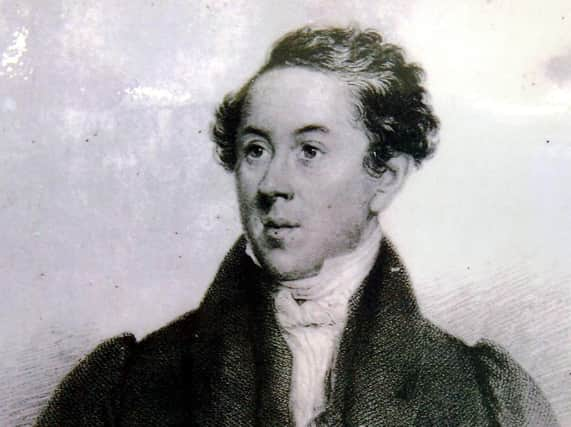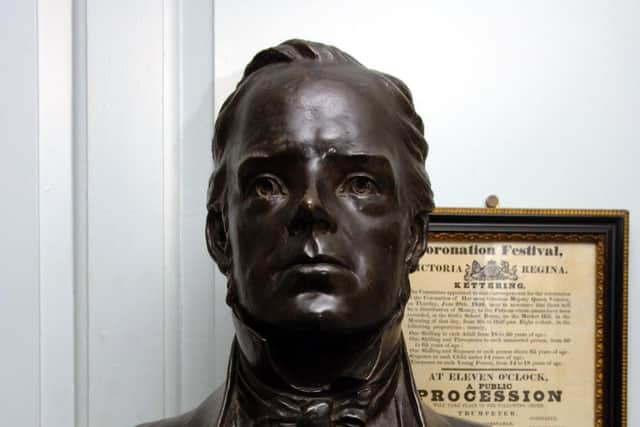Councillors and petition support call for statue of Kettering man who helped end slavery


A petition, fundraiser and councillors are supporting calls for a statue of William Knibb, a slavery abolitionist, to be erected in his hometown of Kettering.
Cllr Mick Scrimshaw, Labour representative of the William Knibb ward in Kettering, has written to KBC leader, Cllr Russell Roberts, to ask for a “permanent statue or monument to William Knibb and the work that he did on our behalf in bringing about the abolition of the slave trade”.
Advertisement
Hide AdAdvertisement
Hide AdIndependent Cllr Jim Hakewill has also written to Cllr Roberts asking for a statue and residents have been signing a petition in support of a monument.


The Kettering Civic Society, which has been calling for a statue for some time, has started a fundraiser.
Ben Humphries, 18, a former Bishop Stopford pupil and current University of York history student, started a petition calling for a statue. He said: “I was inspired by the toppling of the Edward Colston statue in Bristol and the Black Lives Matter movement.
“I think that William Knibb was one of the most important people involved in slave abolition and he didn’t stop once slaves were freed, he helped build and educate the freed slaves.”
Advertisement
Hide AdAdvertisement
Hide AdBen has written to Kettering’s MP, Philip Hollobone, and the council to ask for a statue for William Knibb.
Ben’s petition said: “The town of Kettering, Northamptonshire bears in its coat of arms a depiction of a slave with broken manacles.
“However, many of the towns inhabitants don't realise what for and the significance of the Kettering man who helped bring slavery in the British Empire to an end.”
The idea has received some criticism, one commenter on Facebook said: “I'd rather the money went on educating our children effectively. Our history needs to be properly addressed, not white washed.
Advertisement
Hide AdAdvertisement
Hide Ad“A statue seems somewhat performative. How many people will actually stop and read a plaque and delve further into the history behind it?”
William Knibb has not gone without recognition, there is a ward of Kettering and a community centre named after him, and his legacy lives on in Jamaica - a school named after him counts Usain Bolt as one of its alumni.
So who was this abolitionist born in Kettering?
William Knibb was born in Market Street, Kettering, in 1803 and was a Baptist minister who moved to Jamaica in 1824 to run a missionary school, he was warned by the Baptist Missionary Society not to get involved in politics but Knibb was shocked by slavery.
A quote of Knibb’s, shared by Kettering Museum and Art Gallery, said: “I know not how any person can feel a union with such a monster, such a child of hell.
Advertisement
Hide AdAdvertisement
Hide Ad“I feel a burning hatred against it and look upon it as one of the most odious monsters that ever disgraced the earth.”
During his time in Jamaica, Knibb built a new school in Kingston and started teaching more than 200 pupils, both slaves and free people.
The Falmouth Project, a website sharing and celebrating the history of Falmouth, Jamaica, says Knibb defended slaves’ rights and successfully got false charges against Sam Swiney, a black slave, dismissed.
Knibb got caught up in the slave rebellion at Christmas in 1831 and was accused by plantation owners of encouraging the riots, according to Brunel University.
Advertisement
Hide AdAdvertisement
Hide AdThe National Library of Jamaica said: “It is claimed that Knibb’s greatness began with the 1831 insurrection.
“Although he knew nothing of the planned rebellion until about two days before, he was arrested and many false witnesses brought before the court to give evidence against him.
“He however won the case, but was harassed on all sides by the authorities because of his anti-slavery stance.”
The Falmouth Project said Knibb returned to England in 1832 at the request of the Baptists of Jamaica in 1832 and toured the country to speak and oppose slavery. He spoke to select committees in both Houses of Parliament.
Advertisement
Hide AdAdvertisement
Hide AdThe following year, the Slavery Abolition Act 1833 ended slavery across the British Empire, although anyone over the age of six remained ‘apprenticed’. This system lasted until August 1838.
When the apprentice system ended in 1838 and marked the first full day of freedom for slaves, William Knibb said, in a quote shared by Brunel Univeristy: “I pledge myself…never to rest satisfied, until I see my black brethren in the enjoyment of the same civil and religious liberties which I myself enjoy, and see them take a proper stand in society.”
Knibb returned to Jamaica in 1834 and pledged £250,000 collected from church congregations to rebuild chapels destroyed by planters.
He also opened a new school in Falmouth, founded a newspaper for emancipated slaves and helped buy land and establish villages for freedmen, who white landowners often would not sell land to.
Advertisement
Hide AdAdvertisement
Hide AdKnibb’s continued efforts to support freed slaves is partly what inspired Ben to petition for a statue.
Ben wrote: “His efforts to free slaves and help them to free themselves through education and the ability to create their own livelihoods should be commemorated and hasn't been in his home town for too long.”
The petition has attracted 510 signatures so far.
A portrait and bust of William Knibb can be seen in Kettering Museum and Art Gallery.
What do you think? You can let us know by emailing us at [email protected] or contact us on Facebook and Twitter.
A message from the Editor:
Advertisement
Hide AdAdvertisement
Hide AdThank you for reading this story on our website. While I have your attention, I also have an important request to make of you.
In order for us to continue to provide high quality and trusted local news on this free-to-read site, I am asking you to also please purchase a copy of our newspaper when you do your weekly shop.
Our journalists are highly trained and our content is independently regulated by IPSO to some of the most rigorous standards in the world. But being your eyes and ears comes at a price. So we need your support more than ever to buy our newspapers during this crisis.
With the coronavirus lockdown having a major impact on many of our local valued advertisers - and consequently the advertising that we receive - we are more reliant than ever on you helping us to provide you with news and information by buying a copy of our newspaper.